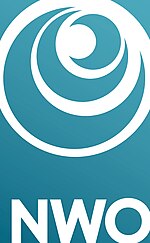|
Dutch Research Council
 The Dutch Research Council (NWO, Dutch: Nederlandse Organisatie voor Wetenschappelijk Onderzoek) is the national research council of the Netherlands. NWO funds thousands of top researchers at universities and institutes and steers the course of Dutch science by means of subsidies and research programmes. NWO promotes quality and innovation in science. NWO is an independent administrative body under the auspices of the Dutch Ministry of Education, Culture and Science. NWO directs its approximate budget of 1 billion euros towards Dutch universities and institutes, often on a project basis. Also, NWO has its own research institutes and facilitates international cooperation. The president of NWO since April 2021 is Marcel Levi. Former NWO presidents include Stan Gielen, Peter Nijkamp and Jos Engelen. NWO is also known for the annual Spinoza and Stevin Prizes. HistoryThe council was established in 1950 as Nederlandse Organisatie voor Zuiver-Wetenschappelijk Onderzoek (ZWO). This organisation did not focus on applied research; the research organization TNO was established for that purpose. In 1988 ZWO was renamed as NWO and was given the broader mission. Like its predecessor, NWO is a public institution; its tasks and responsibilities are established in the NWO Act.[1] On 1 January 2018 the former FOM institutes AMOLF, ARCNL, DIFFER and Nikhef and the over 200 university workgroups from the former FOM projects merged with the other NWO institutes (NWO-I): ASTRON, CWI, NIOZ, NSCR and SRON. NWO signed the Berlin Declaration on Open Access to Knowledge in the Sciences and Humanities in May 2005.[2] NWO organisationNWO DomainsNWO's core task is performed in the NWO domains, research institutes and regional bodies: encouraging quality and innovation in the sciences. The NWO domains organise the programmes and the research funding. Both the Executive Board and the NWO Domain Boards have the competence to allocate public funding for scientific research.
Health Research and Development is managed by ZonMw. WOTRO Science for Global Development is a domain intersecting initiative. NWO-I, Institutes Organisation of NWONWO-I, the Institutes Organisation of NWO, works closely with the NWO domains and encompasses 9 institutes. The office of NWO-I supports all institutes.
The institute Data Archiving and Networked Services (DANS, in cooperation with KNAW) and Netherlands eScience Center, in cooperation with SURF are also part of NWO. Temporary Task ForcesThe Temporary Task Forces have a semi-permanent status. They collaborate with industry experts in order to accelerate the development of promising technologies.
Stevin PrizeThe Stevin Prize (Dutch: Stevinpremie) is one of the highest scientific awards in the Netherlands, established to recognize and reward outstanding researchers whose work has significant societal impact. It is administered and awarded by the NWO.[3] The Stevin Prize was established by the NWO in 2018. Named after Simon Stevin, a Flemish mathematician and engineer, the prize highlights contributions that bridge the gap between scientific research and practical applications that benefit society.[4] The prize was created to emphasize the importance of applied science in addressing real-world problems and contributing to societal progress. Since its inception, the Stevin Prize has been awarded annually to researchers across various disciplines, focusing on both scientific excellence and the potential for real-world application and societal benefit. It is awarded each year to two to three researchers.[5] Over the years, the prize has included a substantial monetary award, typically around 2.5 million euros, intended to support further research and dissemination activities. The Stevin Prize is one of the most prestigious scientific awards in the Netherlands, celebrating the achievements of researchers whose work exemplifies the practical application of scientific knowledge. The prize continues to promote research that addresses societal challenges and enhances community well-being both in the Netherlands and globally. See also
References
External links
|
||||||||||||||||||
Portal di Ensiklopedia Dunia
